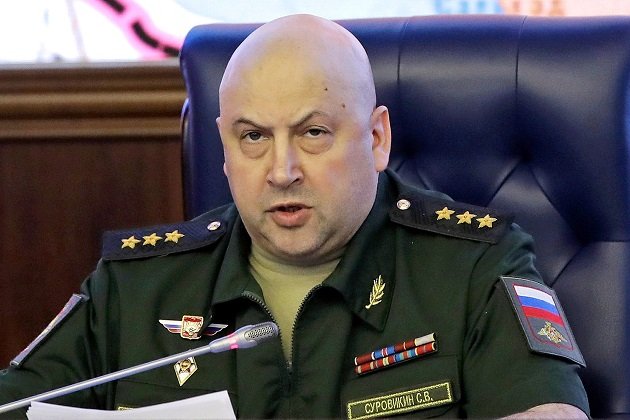Questions swirl over the fate of top Russian commander Sergey Surovikin
Gen. Sergey Surovikin, the commander of the Russian Air Force, has not been seen in public since overnight on Friday when he issued a video appeal to Wagner boss Yevgeny Prigozhin to cease his rebellion. Questions about his whereabouts — and his potential role in the short-lived insurrection — have been swirling in recent days.
On Wednesday, the Russian-language version of the Moscow Times cited two anonymous defense sources as saying that Surovikin had been arrested in relation to the failed mutiny. CNN has not been able to independently verify that claim.
CNN has reached out to the Kremlin and Russian Ministry of Defense for comment on Surovikin’s whereabouts. The Kremlin said on Wednesday, “no comment,” and a defense ministry spokesperson said, “I can’t say anything.”
Kremlin spokesperson Dmitry Peskov said on Thursday that he was unable to answer questions about the speculation around Surovikin and referred journalists’ inquiries to the Russian defense ministry.
Asked whether Russian President Vladimir Putin continued to trust Surovikin, Peskov said: “He [Putin] is the supreme commander-in-chief and he works with the defense minister, [and] with the chief of the General Staff. As for the structural divisions within the ministry, I would ask you to contact the [Defense] Ministry.”
The video released on Friday has raised more questions than answers about Surovikin’s whereabouts and state of mind. He appears in the footage unshaven and with a halting delivery, apparently reading from a script.
A popular blogger going by the name Rybar noted on Wednesday that “Surovikin has not been seen since Saturday [and] it is not known for certain where ‘General Armageddon’ [a nickname Surovikin was given by the Russian press] is. There is a version that he is under interrogation.”
Well-known Russian journalist Alexey Venediktov – former editor of the now shuttered Echo Moscow radio station – also claimed on Wednesday that Surovikin had not been in contact with his family for three days.
Here’s who says he is not in custody: A former Russian member of Parliament, Sergey Markov, said on Telegram that Surovikin had attended a meeting in Rostov on Thursday, although he did not say how he knew this.
“Surovikin appeared at a meeting in Rostov,” he said. “As I wrote above, the rumors about the arrest of Surovikin are dispersing the topic of rebellion in order to promote political instability in Russia.”
Citing US officials who it said were briefed on American intelligence, The New York Times reported on Wednesday that Surovikin “had advance knowledge of Yevgeny Prigozhin’s plans to rebel against Russia’s military leadership.”
Additionally, Russian Telegram channel Baza has posted what it said is a brief interview with Surovikin’s daughter, Veronica, in which she claims to be in contact with her father and insists that he has not been detained. CNN cannot confirm the authenticity of the recording.
“Honestly, nothing has happened to him. He is at his workplace,” Surovikin’s daughter apparently said. Asked whether her father has been detained, she said: “No, of course not. When has he ever been in the media every day? He never makes daily statements … From what I understand, everything is proceeding as usual. Everyone is at their workplaces, and everything is fine.”
Who is Surovikin?
Surovikin, whose military career began in 1983, has a checkered history and a reputation for alleged brutality.
He first served in Afghanistan in the 1980s before commanding a unit in the Second Chechen War in 2004. He was the commander-in-chief of the Russian Aerospace Forces during Russia’s operations in Syria, which saw Russian combat aircraft causing widespread devastation in rebel-held areas.
In 2004, according to Russian media accounts and at least two think tanks, he berated a subordinate so severely that the subordinate took his own life.
And a book by the Washington DC-based Jamestown Foundation, a think tank, said that during the unsuccessful coup attempt against former Soviet President Mikhail Gorbachev in August 1991, soldiers under Surovikin’s command killed three protesters, leading to Surovikin spending at least six months in prison.
In a 2020 report, Human Rights Watch named him as “someone who may bear command responsibility” for the dozens of air and ground attacks on civilian objects and infrastructure in violation of the laws of war” during the 2019-2020 Idlib offensive in Syria.
The attacks killed at least 1,600 civilians and forced the displacement of an estimated 1.4 million people, according to HRW, which cites UN figures.
In addition, the chief of the General Staff of Russia’s armed forces, Gen. Valery Gerasimov, has also not been seen since the weekend. Gerasimov is the commander of Russia’s war in Ukraine.
CNN’s Jo Shelley, Sophie Tanno and Sarah Dean




